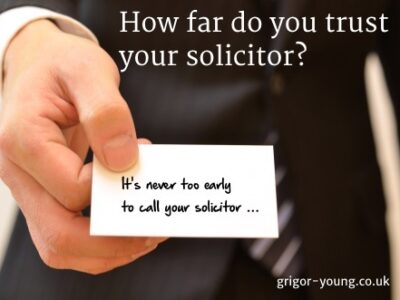You have probably heard it said that it’s a shame how 90% of lawyers give the rest of their profession a bad name.
How far do you trust your solicitor and how far do you trust solicitors, in general?
Research from 2014, conducted through the Law Society of Scotland, suggests that members of the public hold Scottish solicitors in high regard.
The research carried out by Ipsos MORI revealed that, of those people who had used the services of a solicitor in the previous 5 years, more than 90% considered their own solicitor to be either very trustworthy or fairly trustworthy.
Looking at the solicitor profession as a whole, 87% of respondents considered them to be either very or fairly trustworthy.
[NOTE: Here is a link to the results of a Law Society of Scotland survey, published in December 2018, in which the findings were similar].
Expertise
Of those polled in the 2014 survey, 89% considered their solicitor to be an expert in their area of law.
This is something we have emphasised as important in a number of areas, for example, personal injury.
Our advice would be, wherever possible, to use an independent benchmark of expertise such as accreditation as a specialist in the particular area of law by the Law Society of Scotland or another reputable and independent body.
Reputation and expertise
The survey confirmed a solicitor or law firm’s reputation / expertise to be the most important factors for people seeking legal advice.
There was almost equality in the percentages of those polled who said the reputation of a solicitor or firm was most important (23%) and those saying a solicitor’s experience or expertise was most important (22%).
Price was a relatively unimportant factor overall, with only 11% of respondents saying that cost was the most important factor in choosing a solicitor.
The role of the solicitor
It is reassuring to know that solicitors are generally still considered to be trustworthy because they do need to help people at crucial stages in their lives, dealing with matters which are personal and confidential.
The range of matters covers everything from helping you buy a house, recover compensation as part of a personal injury claim, making a will to provide security for your loved ones or in other areas of litigation such as divorce or criminal law.
Regulation of solicitors
The public seem to have confidence in the regulation of solicitors.
73% of those surveyed said they believed that a solicitor involved in serious wrongdoing would be disqualified from working as a solicitor.
How to find a solicitor
The research has shown a rise in the proportion of people using the internet to find a solicitor: from just over a quarter of those polled in 2011 to just over a third in the present results.
The continuing changes in the ways people obtain information about local services are reflected in the fact that those using telephone directory to find a solicitor had dropped from 28% in 2011 to 12% in the current survey.
Reasons for dissatisfaction
Whilst less than 10% of respondents expressed dissatisfaction with their own solicitor, it is notable that the main reasons given were:
- that the solicitor did not have sufficient expertise;
- poor communication;
- and cases taking too long to conclude.
The privileged position of solicitors
A recent appeal case decision from the Court of Session has emphasised the privileged position held by solicitors.
A solicitor had acted for a client in a property transaction. The client borrowed money from an investment company, receiving several payments.
The solicitor later discovered that the client was committing a fraud. The client did not own the property against which the investment company’s loans were secured.
Nevertheless, the solicitor did not notify the investment company of his discovery.
The investment company made a further payment to the client even after the solicitor was aware of the true position.
The court decided, in those circumstances, that the investment company was entitled to recover the amount of the further payment from the solicitor’s firm, in which he was a partner at that time.
Referring to the duties of solicitor, Lord Menzies said:
“Society expects high standards from a Scottish solicitor. Perhaps first and foremost, a solicitor is expected to have the highest standards of honesty. He (or she) is an officer of the court, and those obligations to the client, to the court, to fellow members of the profession, and to the general public. … A solicitor requires to have the trust of his fellow solicitors, and it is a grave fault to do anything which betrays that trust. Thus, a solicitor must always keep his word, even at extreme cost to himself, and must never knowingly mislead colleagues.”
Lord Malcolm’s opinion was that:
“Solicitors owe a duty towards the administration of justice in the broad sense of doing right to the people within the sphere of their professional activities. They are expected to demonstrate high standards of probity and fair dealing. All professional persons owe duties beyond themselves and their clients to the wider common good. They enjoy certain privileges and benefits, but these are accompanied by wider responsibilities and expectations.”
The solicitor in question paid a high price, in that he had to resign from his job and he was also found guilty of professional misconduct by the Law Society of Scotland.
How we can help
At Grigor & Young, we provide a range of legal services.
Feel free to contact us if you have any questions about the content of this article or about any aspect of our legal services.
All initial enquiries are free of charge and without obligation.
You can call us on 01343 544077 or send us Free Online Enquiry.
Original image via Bigstock


 Helping You in Moray to Claim Fair and Full Compensation for Personal Injury
Helping You in Moray to Claim Fair and Full Compensation for Personal Injury